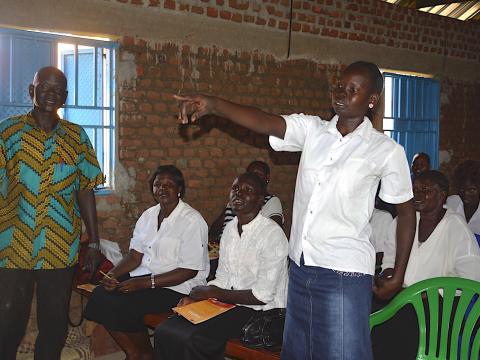Adult literacy program sends women back to school in South Sudan

The United Nations (UN) reports that an estimated 2.2 million school-aged children in South Sudan are out of school and 30 percent of schools are damaged, destroyed, closed or occupied. It further states that the largest group of out-of-school children are girls noting poverty, early marriage, religious and cultural views as among the reasons.
Abuk’s interest in education was revived when she joined the adult literacy class funded by the Fortifying Equality and Economic Diversification (FEED) Bridge Fund. “I learned about the program from my neighbor who is now in level two. I got too excited and immediately registered myself”, Abuk says.
Abuk Akot is a 22-year old mother of two who dropped out of primary school when her family returned from Khartoum, Sudan where her family sought refuge during the conflict in South Sudan.
“I was 17 years old when we left. I was learning in Arabic back in Khartoum but when we came to my hometown Aweil in Northern Bar El Ghazal, I could not continue with education because I refused to start afresh from primary one as advised by the school administration.
Abuk’s mother died in 2002 in Khartoum and she was left with her father Akot who is jobless, her two elder sisters and a brother. She explains, “I dropped my dreams of working in an aviation company because I thought it was difficult to learn English.”

Along with Abuk, a total of 200 women and 10 men were registered in the literacy class to learn writing, reading and numeracy in Kimu and 110 in Gumbo. She has been in the class for six months now and has remained dedicated to learning.
“I have learned a lot since I joined the literacy class since January 2019, especially how to read and write, identify the human body parts. World Vision also provided us with the materials. The environment in the school is conducive for learning”, she shares.
Abuk said she can now read her son’s books and help them with his assignments. She says, “I have learned how to count numbers and read what I am writing. This has greatly encouraged me to continue learning. There are many women who are looking for this opportunity, I am fortunate to be part of it.”

She started encouraging parents in her community to support their children to go to school. Abuk shares, “I do not want my children to stay at home when they grow up. After completing my adult literacy program, I can do something to help my children get an education.”
Kon Awet Awet Food Security and Livelihood Project Manager said the literacy project raised hopes for women who attended the classes in Juba, South Sudan’s capital city. He says, “What I have seen from the adult learners was encouraging. As the project funding has been spent, I am hoping we can continue as we explore for support.”
He concludes, “Through this program, the women will have the chance to education that they missed in their younger years. One educated woman is equivalent to 10 educated men. Many thanks to the Canadian people’s support. I wish them to continue supporting the South Sudanese women.”
VIDEO: A better future for Margret

Story and photos by Scovia Faida Charles Duku, Communications Officer